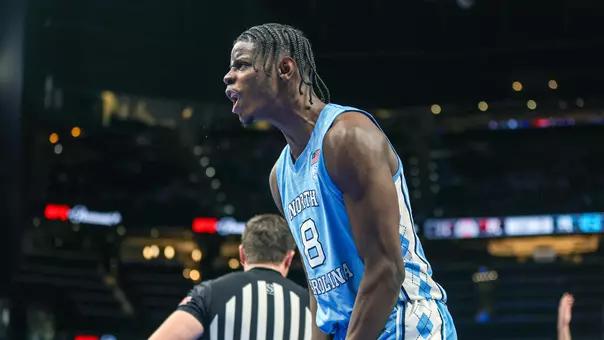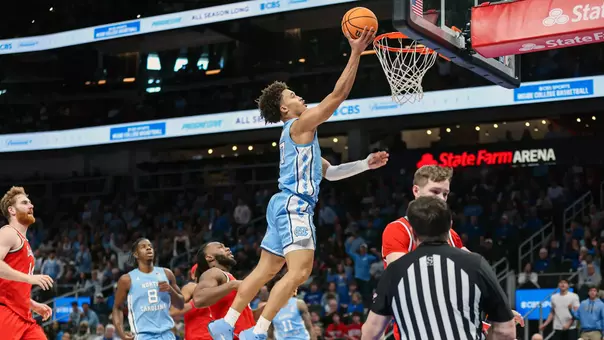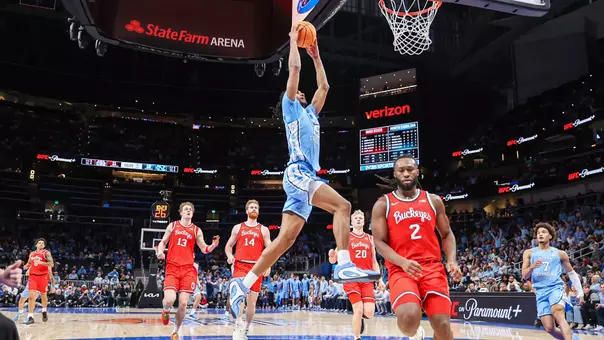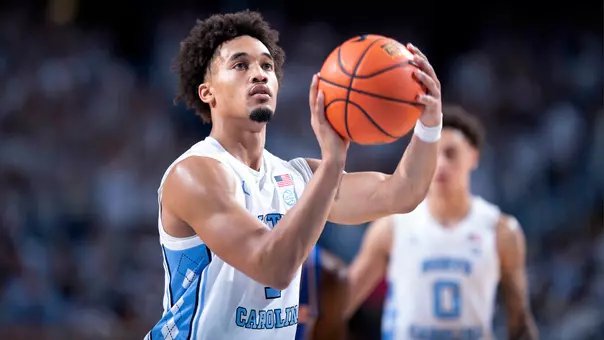University of North Carolina Athletics
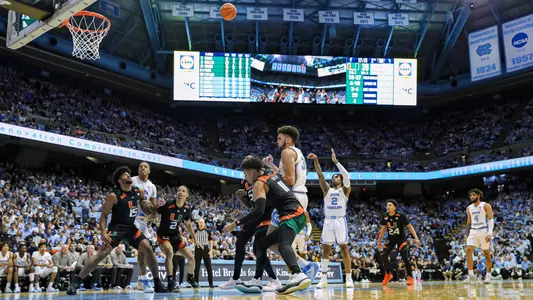
Photo by: ANTHONY SORBELLINI
Lucas: What Came Before
February 14, 2023 | Men's Basketball, Featured Writers, Adam Lucas
Monday's loss hurt, but not as much as what came before it.
By Adam Lucas
After Monday's 80-72 loss to Miami, there can be multiple truths.
The Tar Heels didn't shoot well enough to beat the Hurricanes. That is true. Carolina went 5-for-31 from the three-point line, oddly coupling likely taking too many three-point shots with making too few of them.
But this was not a team that was indiscriminately chucking perimeter jumpers. Carolina missed 26 three-point shots, and without going back to watch every single one, at least 15 to 20 of those misses felt like "good shots." More than a handful of the misses were open opportunities.
So it's true that Carolina didn't play well enough to beat Miami. But an even bigger truth is this: the problem isn't that the loss dropped the Tar Heels to 16-10 overall, 8-7 in the Atlantic Coast Conference, which it did.
No, the true issue is that the Tar Heels didn't come into the game at around 19-6, 10-4 in the league. Because at that point, the loss to the Canes wouldn't feel nearly as critical.
Carolina has now seen every team in the league except Florida State, and right now Miami looks like the best team in the conference. Losing to them shouldn't be a serious emergency. But because of losses like the Iowa State game and the defeat at Virginia Tech and both games against Pitt and the first half no-show at Wake Forest (we won't even mention the four-OT game against Alabama, which might be the nation's best team), Monday's loss feels even bigger.
Win any of those games—heck, get greedy and win most of those games—and losing to the Hurricanes is a minor concern, the kind of defeat that happens in February in the Atlantic Coast Conference.
Instead, we are left to analyze every minute of the contest, from a reasonably well-played first half to a disappointing stretch early in the second half to repeated attempts to cut into a deficit.
Want to hear about something other than the poor field goal shooting? How about this:
Carolina's best player is Armando Bacot. He took just six shots against the Canes, largely because Jim Larranaga had a fairly simple plan on how to defend him: he wanted to make someone else beat Miami.
"Teams are consistently playing us this way," Hubert Davis said to Jones Angell on the Tar Heel Sports Network after the game. "They're not going to let Armando catch the ball in the post and go one on one and dominate the points in the paint. He's too good and too gifted. In order to get that spacing and balance you have to have the ability to shoot the basketball. RJ and Caleb have that ability. We need others to make shots, and tonight we were not able to do it."
On the other side, one of Miami's best players—and on this night, their very best player—is Jordan Miller. The Tar Heels were not as successful with guarding Miller, who finished with 24 points and 11 rebounds, as Miami was with guarding Bacot.
"We just didn't have anyone who could defend Miller," Davis said. "We didn't have someone to box him out. We didn't have anybody to guard his dribble drive. We didn't have anyone to guard him in transition, or his post ups, or his ability to get to the free throw line."
Ouch—let's don't bring up guarding anyone in transition. That's because Carolina's fast break potential was essentially absent on Monday, mustering just two points in that phase of the game. It was jarring when the Tar Heels, down by nine, were gifted a Miami turnover with 4:07 left coming out of a timeout. We've all seen Carolina comebacks before, we know how this works. Get a quick bucket, put a little fear in them, and watch the momentum build. But instead of racing to attack, they allowed the Hurricane defense to set up, and then missed a jumper 15 seconds later. Miami scored on the next trip to go up by 11 points.
So, in summary: Carolina shot a season low from three-point range, saw their best player neutralized, gave up a terrific night to one of the other team's standouts, scored only two fast break points and continues to struggle to create transition chances…and lost by eight.
No, Monday night isn't the main issue. Being in position for Monday night to feel important, though—that's how the Tar Heels got to where they are right now.
There are just five games remaining in the regular season, and what happens in those five contests feels critical to Carolina's postseason fortunes. But so does what happened before those five games.
After Monday's 80-72 loss to Miami, there can be multiple truths.
The Tar Heels didn't shoot well enough to beat the Hurricanes. That is true. Carolina went 5-for-31 from the three-point line, oddly coupling likely taking too many three-point shots with making too few of them.
But this was not a team that was indiscriminately chucking perimeter jumpers. Carolina missed 26 three-point shots, and without going back to watch every single one, at least 15 to 20 of those misses felt like "good shots." More than a handful of the misses were open opportunities.
So it's true that Carolina didn't play well enough to beat Miami. But an even bigger truth is this: the problem isn't that the loss dropped the Tar Heels to 16-10 overall, 8-7 in the Atlantic Coast Conference, which it did.
No, the true issue is that the Tar Heels didn't come into the game at around 19-6, 10-4 in the league. Because at that point, the loss to the Canes wouldn't feel nearly as critical.
Carolina has now seen every team in the league except Florida State, and right now Miami looks like the best team in the conference. Losing to them shouldn't be a serious emergency. But because of losses like the Iowa State game and the defeat at Virginia Tech and both games against Pitt and the first half no-show at Wake Forest (we won't even mention the four-OT game against Alabama, which might be the nation's best team), Monday's loss feels even bigger.
Win any of those games—heck, get greedy and win most of those games—and losing to the Hurricanes is a minor concern, the kind of defeat that happens in February in the Atlantic Coast Conference.
Instead, we are left to analyze every minute of the contest, from a reasonably well-played first half to a disappointing stretch early in the second half to repeated attempts to cut into a deficit.
Want to hear about something other than the poor field goal shooting? How about this:
Carolina's best player is Armando Bacot. He took just six shots against the Canes, largely because Jim Larranaga had a fairly simple plan on how to defend him: he wanted to make someone else beat Miami.
"Teams are consistently playing us this way," Hubert Davis said to Jones Angell on the Tar Heel Sports Network after the game. "They're not going to let Armando catch the ball in the post and go one on one and dominate the points in the paint. He's too good and too gifted. In order to get that spacing and balance you have to have the ability to shoot the basketball. RJ and Caleb have that ability. We need others to make shots, and tonight we were not able to do it."
On the other side, one of Miami's best players—and on this night, their very best player—is Jordan Miller. The Tar Heels were not as successful with guarding Miller, who finished with 24 points and 11 rebounds, as Miami was with guarding Bacot.
"We just didn't have anyone who could defend Miller," Davis said. "We didn't have someone to box him out. We didn't have anybody to guard his dribble drive. We didn't have anyone to guard him in transition, or his post ups, or his ability to get to the free throw line."
Ouch—let's don't bring up guarding anyone in transition. That's because Carolina's fast break potential was essentially absent on Monday, mustering just two points in that phase of the game. It was jarring when the Tar Heels, down by nine, were gifted a Miami turnover with 4:07 left coming out of a timeout. We've all seen Carolina comebacks before, we know how this works. Get a quick bucket, put a little fear in them, and watch the momentum build. But instead of racing to attack, they allowed the Hurricane defense to set up, and then missed a jumper 15 seconds later. Miami scored on the next trip to go up by 11 points.
So, in summary: Carolina shot a season low from three-point range, saw their best player neutralized, gave up a terrific night to one of the other team's standouts, scored only two fast break points and continues to struggle to create transition chances…and lost by eight.
No, Monday night isn't the main issue. Being in position for Monday night to feel important, though—that's how the Tar Heels got to where they are right now.
There are just five games remaining in the regular season, and what happens in those five contests feels critical to Carolina's postseason fortunes. But so does what happened before those five games.
Players Mentioned
UNC Men's Basketball: Tar Heels Escape Ohio State, 71-70
Saturday, December 20
Tar Heels in the Community pres. by NC Electric Co-ops - Share Your Holiday 2025 - December 18, 2025
Friday, December 19
WBB: Post-UNCW Press Conference - Dec. 17, 2025
Thursday, December 18
UNC Women's Basketball: Brooks, Toomey Blow Heels Past UNCW, 84-34
Thursday, December 18











